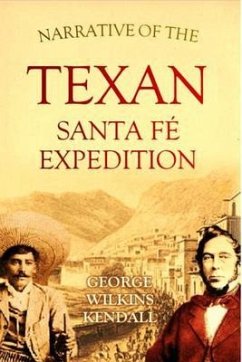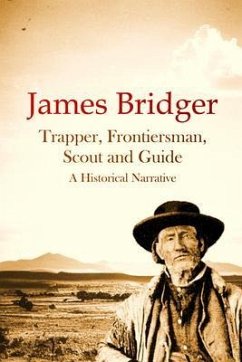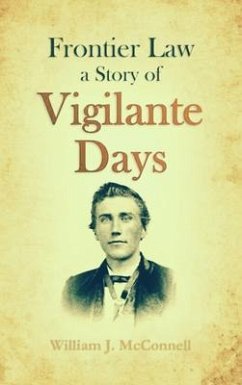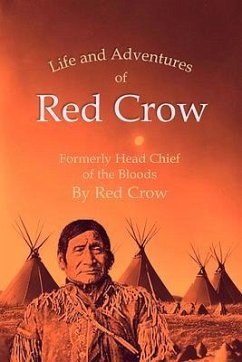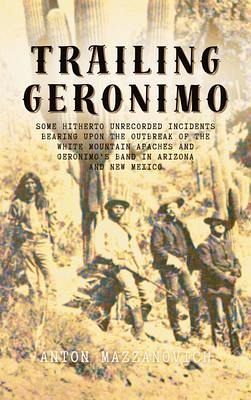
Trailing Geronimo (eBook, ePUB)
Some Hitherto Unrecorded Incidents Bearing Upon the Outbreak of the White Mountain Apaches and Geronimo's Band in Arizona and New Mexico (1926)

PAYBACK Punkte
2 °P sammeln!
"Trailing Geronimo by Anton Mazzanovich...is a vivid narrative of...days when Geronimo and his band of renegade Indians ran amuck over the state...depredating the frontier...a story of running action...seldom is a book written that contains more vaulable and accurate information of the old West." -Winslow Daily Mail, May 28, 1926."Mazzanovich has come into recent prominence through his book Trailing Geronimo...intimate personal details of men and events give the reader an insight into the heroic life of the frontier...one of those rare gems descriptive of pioneer life." -Arizona Republic, Apri...
"Trailing Geronimo by Anton Mazzanovich...is a vivid narrative of...days when Geronimo and his band of renegade Indians ran amuck over the state...depredating the frontier...a story of running action...seldom is a book written that contains more vaulable and accurate information of the old West." -Winslow Daily Mail, May 28, 1926.
"Mazzanovich has come into recent prominence through his book Trailing Geronimo...intimate personal details of men and events give the reader an insight into the heroic life of the frontier...one of those rare gems descriptive of pioneer life." -Arizona Republic, April 18, 1926
"Anton Mazzanovich...famous Indian fighter and scout...membership in 21st Infantry, Sixth Cavalry, New Mexico Rangers, Scout at Ft. Grant...full of tales of the old wild and wooly southwest where he spent the greater part of his life." -El Paso Evening Post.
"Trailing Geronimo is something of an authority on...the day of Geronimo, the murderous Indian chief who plundered Arizona and New Mexico in the 70's and 80's...deals in...Indians, two-gun hombres, sunburned troopers of the 6th US Cavalry, New Mexico Rangers...he has been a barkeep, a professional gambler, a dance hall singer, an actor...as well as a soldier." -Santa Fe New Mexican, September 28, 1929.
Who deserves the real credit for convincing Geronimo and his band of renegades to finally surrender once and for all?
In 1926, Anton Mazzanovich (1860-1934) would write an authoritative narrative off the events that unfolded during his efforts to contain and capture Gernomio and his band of renegades. It is this book that has been republished here for the convenience of the interested reader.
Regarding who should be given credit for inducing Geronimo to surrender, the author notes that "Lieutenant Gatewood, to my knowledge, was never given the credit for the part he so courageously played in inducing Geronimo to meet General Miles at Skeleton Canyon. I also know that Lieutenant Gatewood made no complaint whenever he was ordered out on a duty by his superior officers, but immediately threw himself into the work, and hung doggedly on until that duty was satisfactorily performed. The failure to give Lieutenant Gatewood credit for inducing Geronimo to surrender, was due to two reasons: the jealousy that existed between the Fourth and Sixth Cavalry, and the jealousy of Miles against Crook."
As noted in the book, "From Texas to Montana and from the Mississippi valley to the Pacific, there are countless prosperous communities and millions of people who enjoy all the good things of life, and whose opportunity to create a home and a living for themselves was made possible by the veterans who made the country safe for settlers."
About the author:
Anton Mazzanovich (1860-1934) was a Dalmatian-American soldier and author of real stories of the Wild West. Mazzanovich's work is from a perspective of a participant, an eyewitness and a connoisseur of the Wild West having personal knowledge of the individuals he personally met and wrote about. He joined the famed U.S. 6th Cavalry and was posted at Fort Lowell in Tucson in 1881. He was a participant in the Apache Wars. His career in the military enriched him with so many experiences that he later wrote about them in books. He also had a stint as an actor in very early Hollywood silent films in 1918.
"Mazzanovich has come into recent prominence through his book Trailing Geronimo...intimate personal details of men and events give the reader an insight into the heroic life of the frontier...one of those rare gems descriptive of pioneer life." -Arizona Republic, April 18, 1926
"Anton Mazzanovich...famous Indian fighter and scout...membership in 21st Infantry, Sixth Cavalry, New Mexico Rangers, Scout at Ft. Grant...full of tales of the old wild and wooly southwest where he spent the greater part of his life." -El Paso Evening Post.
"Trailing Geronimo is something of an authority on...the day of Geronimo, the murderous Indian chief who plundered Arizona and New Mexico in the 70's and 80's...deals in...Indians, two-gun hombres, sunburned troopers of the 6th US Cavalry, New Mexico Rangers...he has been a barkeep, a professional gambler, a dance hall singer, an actor...as well as a soldier." -Santa Fe New Mexican, September 28, 1929.
Who deserves the real credit for convincing Geronimo and his band of renegades to finally surrender once and for all?
In 1926, Anton Mazzanovich (1860-1934) would write an authoritative narrative off the events that unfolded during his efforts to contain and capture Gernomio and his band of renegades. It is this book that has been republished here for the convenience of the interested reader.
Regarding who should be given credit for inducing Geronimo to surrender, the author notes that "Lieutenant Gatewood, to my knowledge, was never given the credit for the part he so courageously played in inducing Geronimo to meet General Miles at Skeleton Canyon. I also know that Lieutenant Gatewood made no complaint whenever he was ordered out on a duty by his superior officers, but immediately threw himself into the work, and hung doggedly on until that duty was satisfactorily performed. The failure to give Lieutenant Gatewood credit for inducing Geronimo to surrender, was due to two reasons: the jealousy that existed between the Fourth and Sixth Cavalry, and the jealousy of Miles against Crook."
As noted in the book, "From Texas to Montana and from the Mississippi valley to the Pacific, there are countless prosperous communities and millions of people who enjoy all the good things of life, and whose opportunity to create a home and a living for themselves was made possible by the veterans who made the country safe for settlers."
About the author:
Anton Mazzanovich (1860-1934) was a Dalmatian-American soldier and author of real stories of the Wild West. Mazzanovich's work is from a perspective of a participant, an eyewitness and a connoisseur of the Wild West having personal knowledge of the individuals he personally met and wrote about. He joined the famed U.S. 6th Cavalry and was posted at Fort Lowell in Tucson in 1881. He was a participant in the Apache Wars. His career in the military enriched him with so many experiences that he later wrote about them in books. He also had a stint as an actor in very early Hollywood silent films in 1918.
Dieser Download kann aus rechtlichen Gründen nur mit Rechnungsadresse in A, D ausgeliefert werden.






